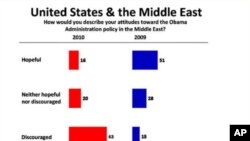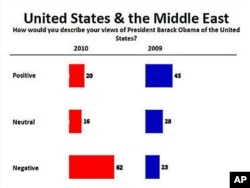A recent poll of public opinion in the Middle East shows that most Arabs hold strongly negative attitudes toward the United States and U.S. policies in the Middle East.
The annual opinion poll, conducted during July by the University of Maryland and Zogby International, surveyed about 4,000 respondents living in Egypt, Saudi Arabia, Lebanon, Jordan, Morocco and the United Arab Emirates.
Negatives views
It found that 63 percent of respondents hold unfavorable views of the United States.
University of Maryland professor Shibley Telhami, the principle investigator for the survey, notes that just one year ago, more than half of the respondents in a similar Zogby poll were hopeful about American policy in the Middle East.
This year's survey indicates that only 15 percent of Arab citizens are hopeful. Telhami says the survey also reveals that President Barack Obama's disapproval rating among Arabs shot up from 23 percent in 2009 to 62 percent last month.
"They are frustrated because the settlement issue which the president raised early resulted only in a partial settlement freeze, not a full settlement freeze," says Telhami. "They are frustrated because so far the negotiations have been not really tackling the core final status issues in the way that the public expected, and I think that if an agreement is reached, public opinion will completely be transformed."
Disappointment
The Zogby International poll found 61 percent of the Arab public consider the Israeli-Palestinian conflict their greatest disappointment, while 27 percent cite Iraq.
Despite Arab pessimism about an Israeli-Palestinian peace agreement, 86 percent of those surveyed said they are prepared to accept a two-state solution based on 1967 borders. But the number of Arabs who believe that Israel will never accept such a solution has increased from 45 percent in 2009 to 56 percent this year.
Kenneth Pollack, director of the Saban Center for Middle East policy at the Brookings Institution, believes growing Arab mistrust of the U.S. and of President Obama is due to the gap between his promises over the past year and his actual handling of the Palestinian - Israeli conflict.
"One of the obvious things that the president could do is to make a much bigger effort to try to mediate between Israelis and Palestinians, to try to bring them together, to try to push on both sides, to try to find ways to bridge differences and get a real peace process moving," says Pollack.
He believes the incremental approach Mr. Obama has pursued over the past year is not moving the peace process forward as quickly as Arabs in the region would like.
Nuclear Iran
Another significant change in this year's Mideast opinion survey is that 77 percent of Arabs now believe Iran should have the right to develop its nuclear capabilities and should not be pressured to stop its program.
"They do not see Iran as the biggest threat and they are more worried about Israel and about American foreign policy when you ask them to name the two countries that are the most threatening to you," says Telhami. "So Iran is evaluated in the context of the two bigger threats. When they are optimistic about our American foreign policy they are much tougher on Iran."
Telhami says 20 percent of the Arabs surveyed identify U.S. attitudes toward Islam as the issue about which they are most pleased.
Asked to name which world leader they admire most, respondents for the first time favored Turkish Prime Minister Recep Erdogan.
"Because of his positions supporting Palestinians in Gaza war and after the incident of Gaza flotilla," says Telhami. "For that reason he rises to the top, so all these choices are really a function of who is playing the biggest role on the issues they care most about."
President Obama's name didn't even show up on this year's most-admired leaders list.
More Web use
The University of Maryland/Zogby International poll also looked at media consumption trends among Arabs. The survey found the use of the Internet continues to rise across the region. Forty percent of respondents say they use the web several times a week but the vast majority - 73 percent - visit mainly Arab websites.
The Qatar-based Aljazeera TV channel continues to lead viewers' preferences in the Arab world as the main source for reliable news.
Pollack of the Brookings Institution notes that ever since the 9/11 terrorist attacks in 2001, American policy makers have paid much closer attention to the undercurrents in the Arab world. He believes they understand that the anger and frustration captured in this new poll can have a very real and significant impact on American national security.
But Pollack believes Arab public opinion is just one piece of a complex mix of factors U.S. officials must weigh in formulating America's policy in the region.





